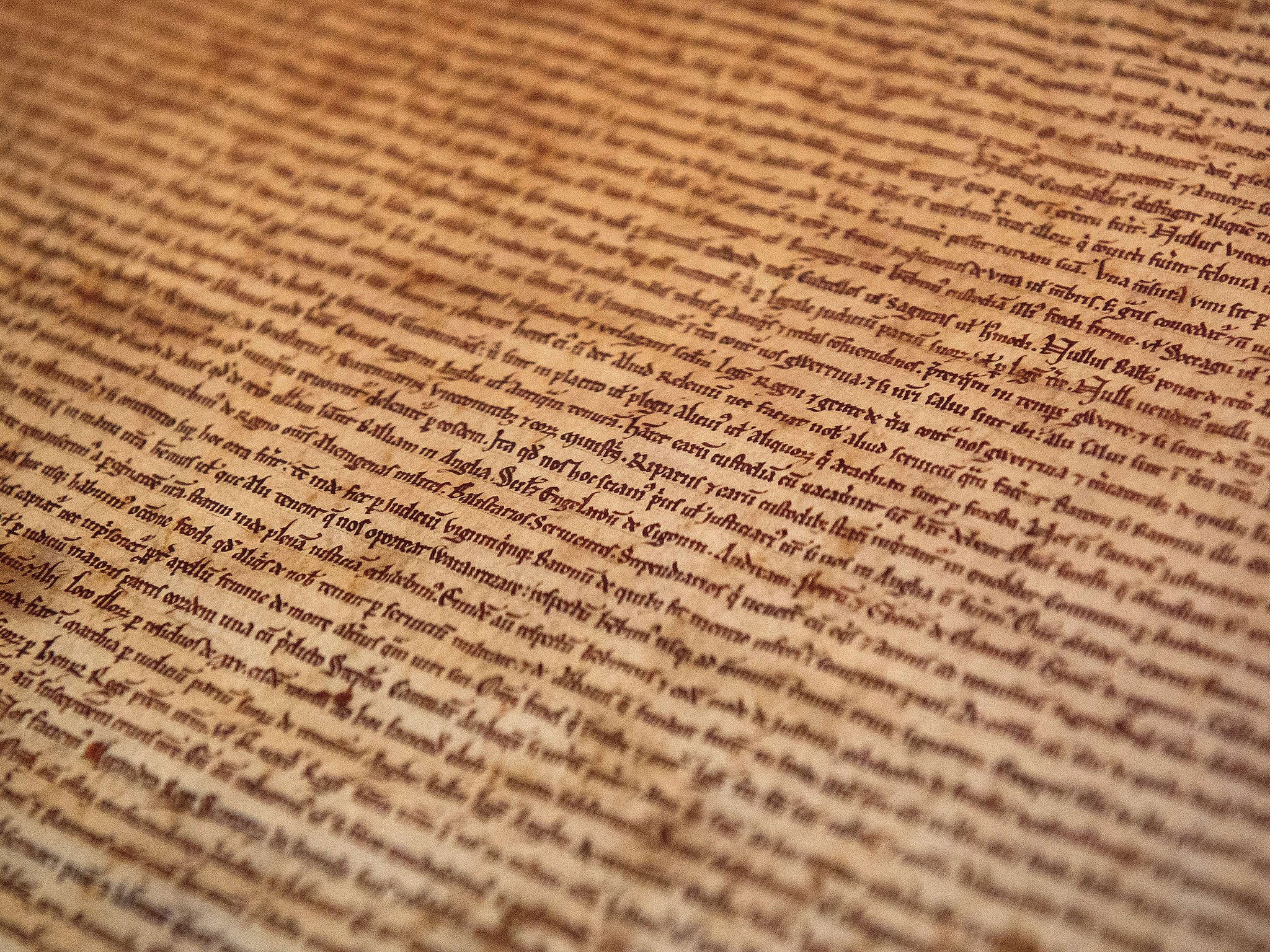Britain's unwritten constitution: The 20 key texts that stop us being slaves
In day one of a major new series: The Independent Guide to the UK Constitution, we explore the rights of citizens

1 | ‘Magna Carta’ (1215).
Signed by King John on 15 June 1215, the first Magna Carta is now of largely symbolic value. But paragraphs 39 and 40 remain the most famous of all assertions of British subjects’ rights.
2 | Assize of Clarendon (1166)
Promulgated by Henry II, this otherwise obscure document is the earliest significant written underpinning of the principle of trial by jury.
3 | Petition of Right (1628)
The document that provoked Charles I into ruling for 11 years without Parliament, this is a fundamental assertion of those rights of the subject that cannot be usurped by the monarch.
4 | The Habeas Corpus Act (1679)
Prohibits the indefinite detention of suspects without trial.
5 | Bill of Rights (1689)
The legislative fruit of the Glorious Revolution of 1688, this crucial document lays down limits on the powers of the monarch and sets out the rights of Parliament.
6 | Act of Settlement (1701)
Guarantees the independence of the judiciary from royal interference.
7 | ‘Commentaries on the Laws of England’, by Sir William Blackstone (1765-1769)
The first serious attempt to codify the countless legal judgments and statutes relating to constitutional issues.
8 | ‘The English Constitution’, by Walter Bagehot (1867 & 1873)
Another commentary that has acquired semi-institutional status. Particularly good on defining the largely indefinable role of the Monarch in relation to Parliament.
9 | ‘A Practical Treatise on the Law, Privileges, Proceedings and Usage of Parliament’, by Erskine May (1844)
Often cited as the ultimate authority on parliamentary procedure and the relationships between the executive, the legislature and the sovereign.
10 | ‘An Introduction to the Study of the Law of the Constitution’, by A V Dicey (1885)
Source of the oft-quoted view that the “twin pillars” of the UK constitution are the supremacy of Parliament and the “rule of law”.
11 | The Parliament Act (1911)
Limits the power of the House of Lords to block legislation passed by the Commons.
12 | The Salisbury Convention (1945)
Established the principle that peers in the House of Lords should not oppose legislation that appeared in the governing party’s election manifesto once it reaches its second reading.
13 | The European Communities Act (1972)
The legal basis (with various successor acts and treaties) of the UK’s membership of the EU. Declares that all present or future “rights, liabilities, obligations and restrictions” created by European law will automatically be applicable in the UK, “without further enactment” by Parliament.
14 | Laws in Wales Acts (1536 and 1543)
Now superseded, this legislation remains significant for its unambiguous assertion that Wales is “for ever from henceforth incorporated, united and annexed to” England.
15 | The Acts of Union (1707, 1800 and 1801)
The 1707 Act decreed that “England and Scotland be forever united in one kingdom by the name of Great Britain”. The 1800 and 1801 Acts created a single polity of Great Britain and Ireland.
16 | The Scotland Act (1998), the Northern Ireland Act (1998) and the Government of Wales Acts (1998 & 2006)
Established the three devolved legislatures which exist today.
17 | Human Rights Act (1998)
Defines the relationship between UK statute and the European Convention of Human Rights; includes a rare statutory statement of the right to freedom of speech.
18 | R (Simms) v Home Secretary (1999)
Lord Hoffmann’s judgment laid down the principle that: Parliamentary sovereignty means Parliament can, if it chooses, legislate contrary to fundamental principles of human rights.
19 | The Constitutional Reform Act (2005)
Modified the office of the Lord Chancellor and set up a Supreme Court; also created an independent Judicial Appointments Commission – removing the monarch’s role in the appointment of judges.
20 | Cabinet Manual (2011)
The most up-to-date document setting out the laws, conventions and rules setting out how Government works, with particular reference to the formation of governments.
Subscribe to Independent Premium to bookmark this article
Want to bookmark your favourite articles and stories to read or reference later? Start your Independent Premium subscription today.

Join our commenting forum
Join thought-provoking conversations, follow other Independent readers and see their replies